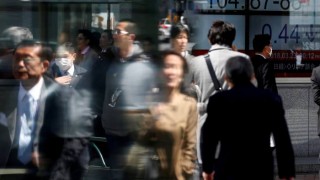Loading
Search
▼ Japan’s Dying Shareholders Signal Sombre Outlook For Its Stocks
- Category:Other
Investors should expect decades of selling pressure on Japanese stocks from the most implacable bears in the market: the recently deceased, according to investment bank Nomura.
The relentless sell-off, which threatens to intensify until the year 2040 as the huge, wealthy postwar baby boom generation expires, arises from an estimate that about 80 per cent of inherited shares are immediately sold by heirs. “The more people pass away, the more assets there are to be inherited,” concluded Nomura’s chief equity strategist, Hisao Matsuura, in a research note that prominently charted Japan’s steep mortality curve.
Just over 1.3m Japanese died in 2017, and the figure will peak at about 1.7m a year in about 20 years’ time but, said Mr Matsuura, almost no statistics are available on inheritance patterns in Japan. Knee-jerk liquidations of the portfolios of the dead by their families, which Nomura puts at a steady ¥2tn per year in 2018, threaten to undermine one of the central goals of the Abenomics growth policies of Prime Minister Shinzo Abe and his efforts to drive more of Japan’s household savings into risk assets.
As well as framing the scale of the issue, the Nomura research discovered that the “dead sales” phenomenon is disproportionately biased towards higher yielding stocks — the type of shares strongly favoured by the elderly and the very class of equities that the government had hoped would be of most appeal to investors entering the market for the first time. Japan’s two recent mega flotations of state assets — of Japan Post in 2015 and JR Kyushu the following year — pitched dividend yield as the prime selling point.
The planned December initial public offering of SoftBank’s mobile unit, which bankers say may attempt to raise as much as $30bn, with 90 per cent of that from retail investors, will also tout itself via a high yield. The government’s introduction in 2014 of a UK-style, tax-efficient ISA product has been less successful than hoped, and produces only about ¥400bn of inflows to equities every year.
Nomura’s research into the portfolio trends of the dead began as an attempt to explain why Japanese individuals are such consistent net sellers of their own market, having sold an average of ¥3.1tn a year between 2003-17.
Combining the Tokyo Stock Exchange’s data on share ownership and other government surveys on financial behaviour by individuals, Nomura found that of the roughly ¥108tn ($950bn) of listed equities held by Japanese individuals, about 70 per cent are held by people in their sixties and seventies.
When those figures are overlaid with Japan’s current and future mortality rates, Nomura estimates about ¥2.6tn of shares will be inherited every year by 2020 and about ¥3.0tn by 2030. To calculate the liquidation rate by heirs, Nomura turned to a 2017 financial opinion survey by the Bank of Japan, in which more than 80 per cent of people in the 40-plus age group — the prime bracket of likely inheritors — said they had absolutely no intention of holding any financial products that carried a risk of loss of principal.
Assuming that something around that 80 per cent rate is already behind the consistent selling by individual Japanese and can be applied to future inheritances, about ¥2tn a year is being sold from the portfolios of the dead.
- October 22, 2018
- Comment (0)
- Trackback(0)


